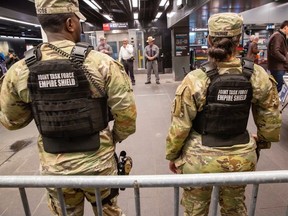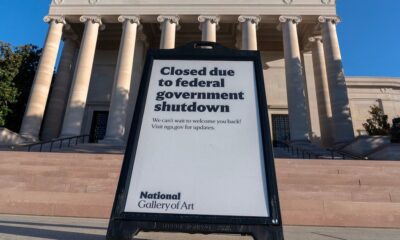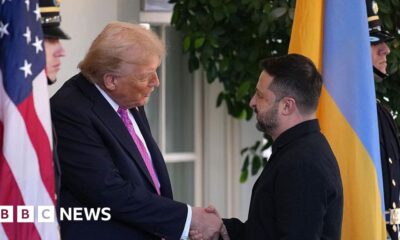Politics
Trump Federalizes Policing, Ignoring Constitutional Safeguards

President Donald Trump has taken significant steps towards federalizing policing, coinciding with his decision to deploy 200 Oregon National Guard soldiers to Portland. In the same week, Trump signed a Presidential National Security Memorandum that outlines plans to expand federal authority over local law enforcement, raising concerns about constitutional protections against such practices.
This development marks a departure from the principles established by the framers of the Constitution. When James Madison and his contemporaries drafted the Constitution and the Bill of Rights, they aimed to create a limited federal government confined to specific powers granted to Congress. Notably, public safety was not included in these federal powers. The 10th Amendment serves as a reminder that powers not delegated to the federal government are reserved for the states, a concept known as federalism.
The term “police power” pertains to the inherent authority of states to govern for the health, safety, and welfare of their citizens. Historically, the distinction between state and federal law enforcement was respected until the aftermath of the September 11 attacks. The George W. Bush administration initiated a collaboration between federal and state authorities in response to perceived threats, which has since blurred the lines between state responsibilities and federal oversight.
The Patriot Act, enacted shortly after 9/11, permitted federal agents to bypass traditional legal procedures, including the ability to issue their own search warrants. This shift allowed federal agencies, including the FBI, to expand their reach into areas previously governed by state law enforcement. Critics argue that this encroachment undermines the constitutional fabric of federalism, as it grants the federal government the power to intervene in local policing under the guise of national security.
The recent Memorandum issued by Trump emphasizes public safety as a federal priority. It instructs federal authorities to monitor and disrupt groups perceived as anti-capitalist, anti-American, or anti-Christian. Trump has also reserved the right to deploy armed troops to American cities, a move that has drawn criticism from local leaders. In Portland, the governor, the mayor, and the police chief have publicly contested Trump’s claims regarding the necessity of military intervention, asserting that the situation on the ground was misrepresented.
Public safety is fundamentally a function of government intended to be managed by local authorities that are closest to the communities they serve. This principle, known as subsidiarity, suggests that governmental intervention should employ the least force necessary while respecting individual freedoms. Madison’s vision of limited government is at risk as Congress has increasingly sought to expand its powers, often using funding as leverage to impose federal regulations on states.
An illustrative example of this trend can be seen in the case of South Dakota, where federal funding was tied to the state’s agreement to raise its legal drinking age. The Supreme Court upheld this conditional funding, setting a precedent for federal influence over state governance. Today, the federal government appears intent on seizing control over local law enforcement, examining speech content, and preemptively categorizing individuals as threats to public safety.
As Trump asserts his authority, the implications of federal overreach raise serious questions about the future of civil liberties in the United States. The potential for government actions based on perceptions rather than established legal processes poses significant risks to individual rights. As history has shown, the sacrifice of liberty in the name of safety often does not yield the intended results, leaving citizens vulnerable to encroachments on their freedoms.
The recent actions by Trump serve as a crucial reminder of the need to protect constitutional norms and uphold the delicate balance between state and federal power. The evolving landscape of policing in America demands careful scrutiny as the ramifications of these decisions unfold.
-

 World3 months ago
World3 months agoScientists Unearth Ancient Antarctic Ice to Unlock Climate Secrets
-

 Entertainment3 months ago
Entertainment3 months agoTrump and McCormick to Announce $70 Billion Energy Investments
-

 Science3 months ago
Science3 months agoFour Astronauts Return to Earth After International Space Station Mission
-

 Lifestyle3 months ago
Lifestyle3 months agoTransLink Launches Food Truck Program to Boost Revenue in Vancouver
-

 Technology2 months ago
Technology2 months agoApple Notes Enhances Functionality with Markdown Support in macOS 26
-

 Top Stories7 days ago
Top Stories7 days agoUrgent Update: Fatal Crash on Highway 99 Claims Life of Pitt Meadows Man
-

 Sports3 months ago
Sports3 months agoSearch Underway for Missing Hunter Amid Hokkaido Bear Emergency
-

 Politics2 months ago
Politics2 months agoUkrainian Tennis Star Elina Svitolina Faces Death Threats Online
-

 Technology3 months ago
Technology3 months agoFrosthaven Launches Early Access on July 31, 2025
-

 Politics3 months ago
Politics3 months agoCarney Engages First Nations Leaders at Development Law Summit
-

 Entertainment3 months ago
Entertainment3 months agoCalgary Theatre Troupe Revives Magic at Winnipeg Fringe Festival
-

 Politics1 week ago
Politics1 week agoShutdown Reflects Democratic Struggles Amid Economic Concerns



















